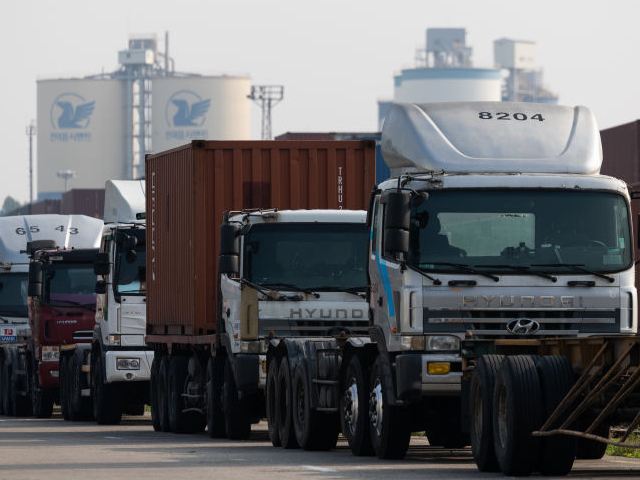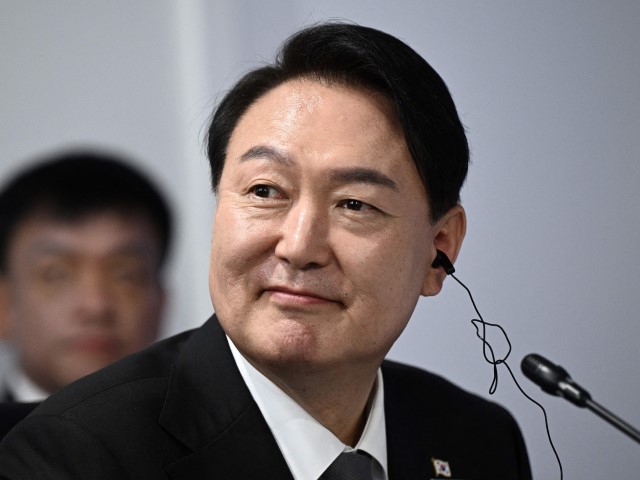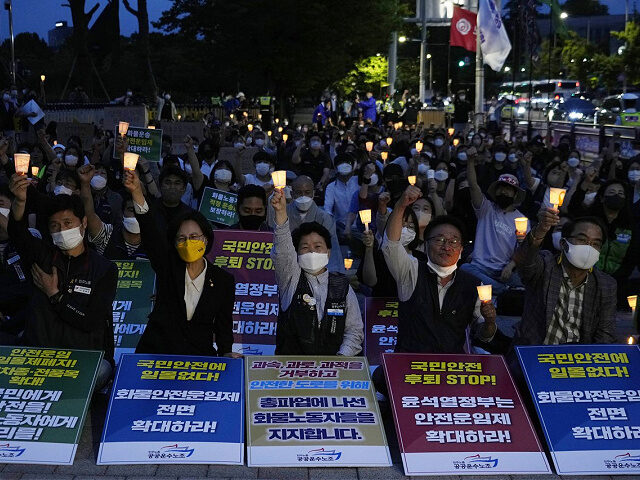The trucker crisis in South Korea came to a head on Tuesday when the government ordered striking truckers to return to work, even though the truckers say that no deal to address their grievances has been reached.
South Korean truckers launched their second strike of 2022 last week after months of negotiations from the first strike failed to reach an agreement. The first strike in June unleashed chaos on the highways and inflicted well over a billion dollars in economic damage. The showdown also inspired other unions to consider strikes and demands of their own, making an economy already under pressure from inflation and rising fuel costs even more jittery.

A line of trucks parked as a protest at the Uiwang Inland Container Depot in Uiwang, South Korea, on Friday, June 10, 2022. Thousands of truck drivers who are seeking to prevent a change to wage rules have gone on strike at major ports and container depots, posing the latest threat to strained global-supply chains. (SeongJoon Cho/Bloomberg via Getty Images)
The strike that began last week is costing South Korea an estimated $224 million per day, and the situation is poised to get even worse because the strike includes fuel truck drivers. Choking off the fuel supply could lead to massive supply chain disruptions that would cripple an economy already recovering more slowly than anticipated from the Wuhan coronavirus pandemic.
The union of striking truckers is relatively small, but their pivotal role in South Korean industry makes the disruption caused by their work stoppage enormous. Container shipping was down on Monday, steel shipments were falling, construction projects were running out of materials, and gasoline shortages were reported.
The striking truckers are particularly concerned with minimum wages, which they want increased to cover the rising costs of their operations, including fuel. The Cargo Truckers Solidarity Union (CTSU) also wants minimum freight rates extended to more products, including oil, to support minimum wages for more truck drivers. South Korean corporations oppose these minimum rates because they increase costs too much, making South Korean enterprises uncompetitive.
The union held its first talks with the South Korean government on Monday but announced no deal had been reached.
“The transport ministry’s position today was that ‘There is nothing the ministry can answer,’” said the disappointed CTSU, which hoped more talks would be held on Wednesday.

South Korea’s President Yoon Suk-Yeol looks on during a trilateral meeting with the U.S. President and Japan’s Prime Minister on the sidelines of the NATO summit at the Ifema congress center in Madrid, on June 29, 2022. (BRENDAN SMIALOWSKI/AFP via Getty Images)
On Tuesday, however, South Korean President Yoon Suk-yeol invoked legal amendments passed in 2004, but never before used, to order the truckers back to work. The law stipulates that failing to return to work without a “justifiable reason” could result in up to three years in jail or a $22,400 fine. The government could also revoke licenses for drivers who refuse to go back to work.
“There’s no way to justify the act of taking the lives of people and the national economy as hostage to accomplish their own interest,” Yoon told a cabinet meeting when activating the “work start order.”
“Please return to your positions before it’s too late,” Yoon said to the striking truck drivers. “I will firmly establish the rule of law between labor and management during my term and will never compromise with illegality.”
Yoon’s order was initially aimed at cement truck drivers because the construction industry has suffered so greatly from the strike. Work disruptions at almost half of the construction sites in South Korea have been reported.
The CTSU responded angrily to Yoon’s order, denouncing it as unconstitutional and claiming it violates international labor treaties. Union leaders shaved their heads to hold a protest against the order in Incheon:
JUST IN: #BNNSouthKorea Reports.
South Korea ordered striking cement truckers to come back to work on Tuesday, an unprecedented move that invokes tough strike-busting laws as construction sites across the country run out of building materials. #SouthKorea #Protest pic.twitter.com/JMYTbvNNUd
— Gurbaksh Singh Chahal (@gchahal) November 29, 2022
“The start-work order is equivalent to martial law for cargo workers. No, it’s an order to die,” the CTSU said in a statement on Tuesday, referring to safety concerns that truckers say would be alleviated if they were paid more.

COMMENTS
Please let us know if you're having issues with commenting.